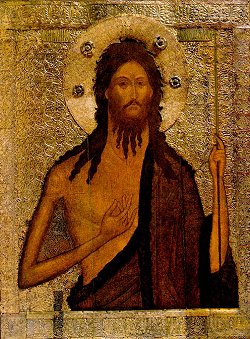|
|||
|---|---|---|---|
| This weekly bulletin insert complements the curriculum published by the Department of Christian Education of the Orthodox Church in America. This and many other Christian Education resources are available at http://dce.oca.org. | |||

Disciples of John the Baptist approached Jesus one day with this question from John: "Are you the one who is to come, or shall we look for another?" John's question occurs in the seventh chapter of Luke's Gospel. As some commentators have noted, he was perhaps hoping for or expecting a more definitive answer than the one he received. John was already in prison by this time, and fairly soon he would face execution. His question may make us wonder: Was John, after all the time he had spent with Jesus, still not sure that He was the Messiah, the One "who is to come"? Or was he beginning to doubt, in the depressing and fearful darkness of a prison cell, what he had been sure of? Was he hoping that Christ would reply to his question so affirmatively that he would know the sacrifice of his own life would be worth it? We can't really know the answers to these questions, but we know that we too might have felt reassured in our faith and comforted by a simple, "Yes, I am the One" response from Our Lord. But He doesn't give that to John, or to us. Instead He asks us to find the answer for ourselves, to use our minds and hearts to decide who He is. So in response to the question He instructs John's disciples to tell their jailed leader what they have seen and heard: healings, dead people raised, good news preached to the poor. He is saying that those who read the Old Testament Scriptures and who then see what He does and hear what He says will recognize Him as the One those Scriptures promise. Father John Behr writes in his book "The Mystery of Christ" that we are called to a "continuing engagement with the scriptures" and that "Christ remains the 'coming one' who opens the scriptures to his disciples so that they can come to know him as Lord." Father Behr comments on the passage from Luke: "Jesus did not give [John] a straightforward answer, but directed him to signs—the blind seeing, the lame walking—which can only be understood as "messianic" through the interpretation of them by scripture (Mt. 11:2-5)." Of course, we have to be willing to do the work of "engaging with" the scriptures. In this same chapter Jesus points out the excuses people can make to ignore any teacher. John the Baptist is an ascetic, so they can accuse him of having a demon. Jesus comes "eating and drinking" unlike John, so they can dismiss Him as a glutton and drunkard. We're challenged to figure out who Jesus Christ is rather than waiting for the answer from Him. He respects the intelligence He has given us, and He knows that we have all the tools we need to decide, and to know for sure, exactly who He is. |
|||
